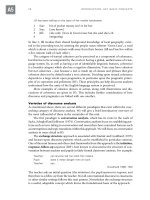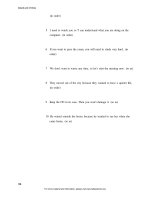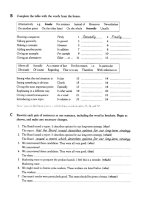Colloquial English Idioms phần 7 pdf
Bạn đang xem bản rút gọn của tài liệu. Xem và tải ngay bản đầy đủ của tài liệu tại đây (216.26 KB, 12 trang )
For more material and information, please visit Tai
Lieu Du Hoc
at www.tailieuduhoc.org
"I don't care twopence about money, " said Her
bert.
(S. M.)
I'm bound to tell you that I don't care two pins if
you think me plain or not. (S. M.) I don't care a rap
what your stepfather is. (H. W.) I don't care two
hoots what counsel'11 do. (V. L.) "I don't, " said old
Jolyon, "care a fig for his opinion." (J. G.)
To dislike something or somebody may be colloquially put
in this way:
it's (he's) not my cup of tea — it (he) doesn't suit my taste;
it is not the sort of thing (person) to appeal to me
''She's not my cup of tea." He grinned. "And I'm
not hers." (C. S.)
Mountaineering isn't exactly my cup of tea. (W.B.)
to have no time for somebody (something) — to dislike
(him, it)
Between you and me, Freddy, I never had much
time for this Manson, but that's neither here nor
there. (A. C.)
I've no time for this sensational journalism.
(W. B.)
I can't stand (bear) it (him) or I can't stand (bear) the
sight of him (it) — I dislike it (him) very much
I can't play. My fingers won't obey me. And
I can't stand the sound of piano. (B. Sh.)
I can't stand awful old men. (C. S.)
She just can't bear the sight of me. (C. S.)
And as for your blunder in taking my wife's
fan from here and leaving it about in Darlington's
room, it is unpardonable.
I can't bear the sight of it now. (O. W.)
I don't care for it; I have no liking for it; it is not to my
liking (taste) are similarly used, all meaning it is not to my
taste; I don't like it.
I don't care for the book. (H. P.)
I don't care for chips fried in olive oil, (W. B.)
90
For more material and information, please visit Tai
Lieu Du Hoc
at www.tailieuduhoc.org
Mr. Claye sighed. "It's a job I've no liking for, " he
said. (J. F.)
John's way of doing things is not at all to my liking.
(W. M.)
to go (be) against the grain — to be distasteful or contrary
to inclination
A thing I've never been able to understand is why a
woman thinks it worth while to make you do
something you don't want to. She'd rather you did a
thing against the grain than not do it at all. (S. At.)
This prosecution goes very much against the grain
of an honest man. (B. Sh.)
Emphatic I like that! means just the opposite of what it says:
it's used as an explosive protest against some suggestion.
"It's mine. Joe Morgan made me a present of it." "A
present! Ho! I like that! He's not 'ere to deny
it."
(A. C.)
Colloquial phrases to express aversion and disgust include
the following:
It sticks in my gizzard (craw, throat, gullet). — It
leaves a feeling of strong dislike or disgust.
That business with Fleur sticks in my gizzard,
as old Forsyte would have said. (J. G.)
She didn't sentimentalise herself but just admitted
that this Dessie business stuck in her gullet.
(V. L.)
But it sticks in my gullet not to do one's best
for the chap with a record like this. (C. S.)
I wouldn't touch him (it) with a pair of tongs, i. e. he (it) is
so disgusting that I will have nothing to do with him (it).
Let her keep her fortune. I wouldn't touch her with
the tongs if she had thousands and millions.
(B.
Sh.)
I was so ragged and dirty, that you wouldn't have
touched me with a pair of tongs. (Ch. D.)
91
For more material and information, please visit Tai
Lieu Du Hoc
at www.tailieuduhoc.org
to give one the creeps (the willies) — to cause one to have
a feeling of strong dislike or revulsion
His sentimental smile gave her the willies. (V. L.)
This weather gives me the creeps. Nothing but rain,
rain, rain. (W. B.)
To make one sick (shudder) means the same thing. If you
don't like it, you can lump it means If you don't like it, all
you can do is to resign yourself and put up with it, however
unwillingly.
"Flying a kite, you, a grown man. Contemptible I
call it."
"I don't care what you call it. I like it, and if you
don't like it you can lump it." (S. M.) "So if, well —
if this new arrangement were made, Margaret Cook
might not like it — " "Couldn't she be told she
would have to lump
it."
(B. R.)
TALK AND DISCUSSION
Informal conversation may be colloquially described by
these general phrases:
to have a few words with or to have a word with — to
have a short talk with; to discuss briefly .
After breakfast, Dorcas came up to me rather
mysteriously, and asked if she might have a few
words with me. (A. Chr.)
"I thought I would come up for a little chat, "
she said brightly. "I haven't had a word with
you for a day or two." (A. C.)
You can have a quiet word with him here, mum.
(B. Sh.)
92
For more material and information, please visit Tai
Lieu Du Hoc
at www.tailieuduhoc.org
"As a matter of fact, " he said to Martin, "I should
like a word with you." (C. S.)
to have a (little) chat (with) — one more phrase with the
same meaning
"Your mother and I have been having a little
chat, " Mark explained. (L. A.)
Well, thank you Matron, I'm glad to have had
a little chat with you. (A. Chr.)
Assunta comes down to have a chat with me now
and then and then I give her a bit of money .
(S. M.)
The gift of the gab is colloquial for power of fluent and
effective speech, and to have the gift of the gab is to have
the ability to speak fluently and effectively; to be eloquent.
"You've got ideas." "Other people's." "And the
gift of the gab." (J. G.)
He was good company, the type of the agreeable
rattle and he had a truly Irish gift of the gab.
(S. M.)
You've got the gift of the gab with a pen,
Mont . (J. G.)
Small talk is light conversation on unimportant subjects;
chit-chat has the same significance — trivial conversation.
At emotional moments like this, Mr. Josser
was always a bit awkward. He hadn't got any
flow of small talk. (N. C.)
"I gave up going to my colleagues' wives' parties
before you were born, my dear young man, "
Winslow said. He added: "I have no small talk."
(C. S.)
Oh, that's the new small talk. To do a person
it means to kill him. (B. Sh.)
"All right, " she said. "Let's talk about you. I
don't feel like chit-chat either." (M. W.)
Waffle (noun and verb) is also similarly used with the
meaning talk without pausing; gabble.
93
For more material and information, please visit Tai
Lieu Du Hoc
at www.tailieuduhoc.org
Gossip (noun and verb) is small talk usually about people as
is also tittle-tattle (idle talk and rumours).
She likes to have a good gossip with a neighbour
over the garden fence. (A. H.)
She is too fond of gossip (or tittle-tattle). (A. H.)
A garrulous person (a chatterbox) is said:
to talk (chatter) nineteen to the dozen — to chatter
incessantly
Captain Bredon soon had his arms round two slim
waists. They all talked nineteen to the dozen. They
were gay. (S. M.)
At tea-time he came down to the drawing-room and
found them talking, as he expressed it, nineteen to
the dozen. (J. G.)
So as a rule I'm silent, but when I find a sympathetic
victim — well, you've already had a bitter
experience of how I chatter nineteen to the dozen.
(R. A.)
to talk somebody's (one's) head off; to talk the leg off
an iron pot; to talk the hind leg off a donkey — to talk
a great deal; to bore a person by talking too much
Andrew, you can talk my head off, but you can't
change wrong into right. (B. Sh.)
The insurance-agent talked Father's head off.
(K. H.)
She could talk the hind leg off a donkey. (W. B.)
Among chatterboxes one can't get a word in edgeways
(i. e. unable to speak because others are talking con-
tinuously).
Sorry. When Pickering starts shouting nobody
can get a word in edgeways. (B. Sh.)
The two elderly ladies were talking incessantly,
so that Jane could not get a word in edgeways.
(K. H.)
"Well, my friend, " cried Poirot before I could
get in a word, "what do you think?" (A. Chr.)
91
For more material and information, please visit Tai
Lieu Du Hoc
at www.tailieuduhoc.org
A verbose person may be also termed:
long-winded — tediously long, verbose; fond of hearing
oneself talk
The speaker was dreadfully long-winded. (W. B.)
The preacher was very long-winded even for a
preacher. (A. W.)
I cannot relate what he told me in his own words.
He repeated himself. He was very long-winded and
he told me his story confusedly (S. M.)
On the other hand avoidance of prolixity is colloquially
expressed by these phrases:
(to put something) in a nutshell — in the fewest possible
words; in brief
This is the story in a nutshell. (A. W.)
In a nutshell, I have given him notice and will
go to Manchester next week. (K. H.)
It was at this moment that the idea came to him
which he afterwards imparted at Timothy's in
this nutshell: "I shouldn't wonder a bit if that
architect chap were sweet upon Mrs. Soames!"
(J. G.)
"To put it in a nutshell, " said Charles slowly,
"you're willing to come in with me because you
think my business could be built up." (7. W.)
to cut (make) a long story short — the substance of it ;
all that need be said
Well, to cut a long story short, they thought it would
be more economical to live at the villa and Laura
had the idea that it would keep Tito out of mischief.
(S. M.)
Well, to make a long story short, she asked me to go
to Paris for a week or two till she had consolidated
her position. (S. M.)
the long and the short of it — all that need be said; the
upshot
Well, the long and the short of it is that officials
mustn't gamble. (B. Sh.)
95
For more material and information, please visit Tai
Lieu Du Hoc
at www.tailieuduhoc.org
I won't repeat her language, it fair startled me but
the long and the short of it was she was jealous of
the kite. (S. M.)
Two common proverbs commenting on speech and silence:
Speech is silver, silence is gold. (Silence is better than
speech in some circumstances. The proverb is usually quoted
to children who talk too much.) Least said soonest mended.
(By saying very little or keeping silence one may avoid
getting into trouble. By saying too much one may bring
trouble on oneself or one's friends and may often find it
difficult to repair the damage that has been done.)
Plain speaking uses the following phrases: to call a spade a
spade — to speak plainly; to speak with complete — and
generally unpopular — frankness
"I think you're the rudest man I've ever met, "
she said in a remote, reflective tone. "And the
most mercenary."
"Why? Because I call a spade a spade?" (L. A.)
There's no family pride about me, there's no
imaginative sentimental humbug about me. I
call a spade a spade (Ch. D.)
I am talking about facts, mademoiselle — plain
ugly facts. Let's call the spade the spade and
say it in one short sentence. Your mother drinks,
mademoiselle. (A. Chr.)
This is no time for wearing the shallow mask
of manners. When I see a spade I call it a spade.
(O. W.)
to go straight to the point or to come to the point — to
speak directly about the matter being discussed and stop
talking about unimportant and less important matters
He was silent for a minute or two. Then he went
straight to the point. "Have you come to a decision,
Linnet?" (A. Chr.) Having settled his guest in a
chair, the actor went straight to the point. "I'm not
going to beat about the bush, " he said.
(A. Chr.)
96
For more material and information, please visit Tai
Lieu Du Hoc
at www.tailieuduhoc.org
I wish Fleur didn't always go straight to the point.
(J. G.)
As I was in a hurry I asked him to come to the point
at once. (A. W.)
not to beat about the bush — to concentrate on the main
subject; not to ramble around without ever getting to the
point
to beat about the bush — to talk about everything except the
most important point; to talk round a subject; approach a
subject in a roundabout and evasive way
Not to beat about the bush, I have reason to
believe that that sweet and innocent lady is
being slowly poisoned. (A. Chr.)
Having settled his guest in a chair the actor
went straight to the point. "I'm not going to
beat about the bush, " he said. (A. Chr.)
"I didn't see any point in beating about the bush, "
said Skeffington. (C. S.)
He spoke bluntly, aware that it was no use to
beat about the bush. (A. Chr.)
to come (get) down to brass tacks — to stop discussing
general principles, plans, etc. and turn attention to practical
details
I haven't got all the afternoon to waste. It's time we
got down to brass tacks. (C. S.) He looks as if he
had plenty of determination but when you come
down to brass tacks he has no backbone. (S. M.)
to say (have) one's say — to state one's views; to express
one's opinion
You have said your say; I am going to say mine.
(Ch. D.)
Winifred, a woman of strong character, let him have
his say, at the end of which he lapsed into sulky
silence. (J. G.)
4 B. B. Сытель 97
For more material and information, please visit Tai
Lieu Du Hoc
at www.tailieuduhoc.org
Plain speaking also implies the use of firm language. In
this case the following phrases are common:
not to mince matters (words) — to speak plainly or
bluntly
I didn't mince matters, but told him plainly
I thought him a scoundrel. (D. E. S.)
You can recall for yourself, Harthouse, what
I said to him. I didn't mince the matter with
him. (Ch. D.)
Oh, I am not going to mince words for you.
I know you thoroughly. (O. W.)
He spoke with fire and conviction, mincing no
words in his attack upon the slaves and their
morality and tactics (V. L.)
Not to pull one's punches is used with the same meaning.
Mrs. Tyson had turned very white. "You don't pull
your punches, do you?" she murmured. "But it may
be different with Hugo. Yes!" she exclaimed turning
on me with glittering eyes.
(L. A.)
I didn't pull my
punches. (W. B.)
to tell a person straight that — to say forcibly and firmly
to him that Also: to give it him straight.
I told him straight that I didn't want him around
the place any longer. (W. B.)
Well, she's never coming here again, I tell you
that straight. (S. M.)
I'll give it to you straight, Savina. We're stuck
for another year. (M. W.)
to speak one's mind — to say plainly what one thinks
"At any rate, " she burst out, "I've spoken my
mind!" (A. Chr.)
You don't mind my speaking my mind this way,
dear? (J. L.)
On an occasion of this kind it becomes more
than a moral duty to speak one's mind. (O. W.)
98
For more material and information, please visit Tai
Lieu Du Hoc
at www.tailieuduhoc.org
To draw a person out
is colloquial for to encourage him to
talk.
After dinner mamma undertook "to draw him out"
and showed him photographs.
(S. L.)
She knew how
to draw people out and whenever a topic seemed to
be exhausted she had a remark ready to revive it
(S.
M.)
To talk about or discuss one's business or profession in non-
professional hours is:
to talk shop.
Don't let's talk shop out of hours, Ellis. It can wait.
Tomorrow is also a day.
(C. S.)
Please can I see you
again? I don't always talk
shop.
(A. C.)
to talk through one's hat
— to talk irrelevantly or without
knowledge; to talk nonsense
You're talking through your hat. You're crazy. What's
got into you anyhow?
(Th. D.)
"I wasn't talking
through my hat!" protested Bing. "I mean it,
Lieutenant."
(S. H )
Many of our politicians are paid
£
400 a year for talking through their hats.
(A. W.)
Now you're talking!
implies that what you said before was
irrelevant but now you're talking sensibly and cogently.
Higglns.
How much?
The Flower Girl
(coming back to him triumphant).
Now you're talking! I thought you'd come off it when
you saw a chance of getting back a bit of what you
chucked at me last night.
(B. Sh.)
Queen Ann is dead!
is an ironical answer to a person im-
parting old news.
Talk about Queen Ann being dead! Talk about news
with whiskers on!
(B. R.)
4*
9
9
For more material and information, please visit Tai
Lieu Du Hoc
at www.tailieuduhoc.org
To break the news is to impart bad news only. If it's good
news one simply tells it to someone.
Couldn't you have broken the news more gently? —
you've nearly killed him. (J. F.) The minister is to
break the news to you. He'll be here presently. (B.
Sh.)
To butt in (cut in) is colloquial for to interrupt a conver-
sation; to interfere in a conversation.
How would he have liked it if I'd kept butting in
when he was talking? (N. C.) I hope I'm not butting
in, but you must let me say how much I admire your
business-like capacity. (A. Chr.)
Excuse me, miss, for buttin' in that way. (V. L.)
"Think of the credit for you, " Andrew cut in
quickly. (A. C.)
to answer (a person) back — to give a rude answer; to be
impolite; to reply impudently
Mary, Mary, don't answer your father back! It's
dreadful to hear you speak up to him like that (A.
C.)
Common phrases for introducing some topic (remark) into a
conversation or discussion are by the way inciden
tally
talking of that reminds me
They may be
similarly used and
usually refer to something the speaker has just thought of.
By the way, you know there are still two more
people to come. Your friends — the Nixeys. (V. P.)
"Incidentally, " said Coot, "haven't you got on the
track of these pictures from the Papoulis collection
yet?" (V. L.)
"Talking of servants, " said Mr. Smith, when he had
applauded the cook. "I suppose that detective fellow
told you what Peter had been?" (V. L.) Ah! That
reminds me I want some money. (B. Sh.)
100
For more material and information, please visit Tai
Lieu Du Hoc
at www.tailieuduhoc.org
to broach the idea (subject, matter, etc.) — to begin to talk
about it; to open a subject of discussion
I had been turning over an idea in my head, and I
felt that the moment had now come to broach
it.
(A.
Chr.)
I knew that if I did not quickly broach the subject on
my mind, this terrible emotion would conquer me.
(A. C.)
to keep the ball rolling — to prevent the conversation (or the
excitement, amusement) from flagging
Whenever our conversation began to flag, it was
Mr. Aungiers who kept the ball rolling by telling
some amusing episode from his life. (K. H.) Dinner
that evening was strangely quiet. Faynes did his best
to keep the ball rolling, with the help of his host, but
Hetty was very thoughtful, Dassy sad, and Ned
preoccupied. (V. L.)
Phrases dealing with discussion include the following: to talk
(things) over — to discuss something in a friendly manner
He's leaving England in a day or two, and there are
several things we have to talk over. (J. P.) Come
now, Nurse Lloyd, don't misunderstand me.
Suppose we talk this over together in the front
room. (A. C.)
He was going to talk over one or two points with
Dr. Maverick this evening. (A. Chr.) Bring along
your young man and let me have a look at him and
we'll talk this over. (A. Chr.)
to thrash (thresh) something out — to discuss it thoroughly;
to clear up (a problem, etc.) by discussion
"Let us thresh the matter out, " said Chaffery,
crossing his legs. "Let us thresh the matter out."
(H. W.)
At four o'clock, when it was all over, Andrew
threshed the matter out with Gill and Hope
in Gill's room. (A. C.)
You must stop to supper — and you and I must
thresh these things out. (H. W.)
101









